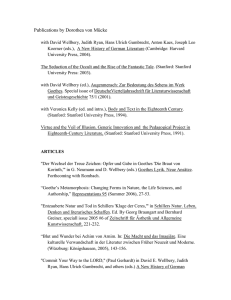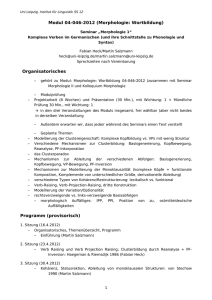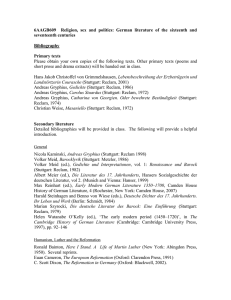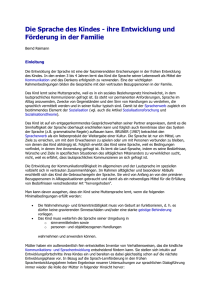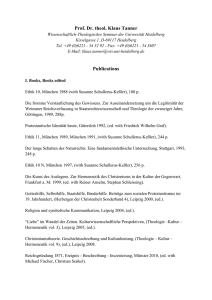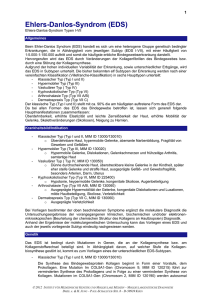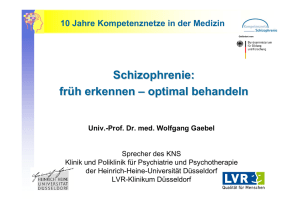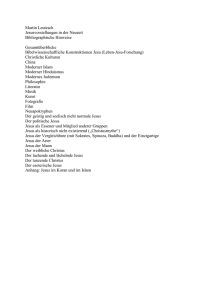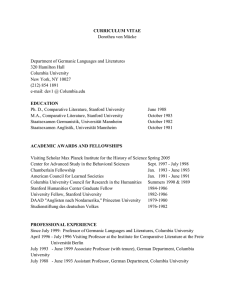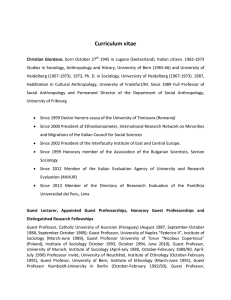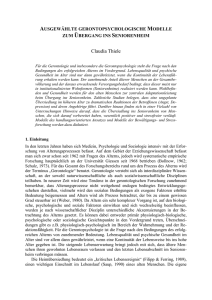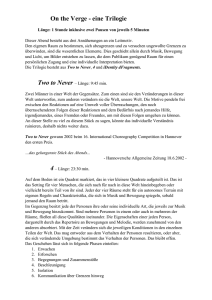Glipp Bibliography - The German Language and the Future of Europe
Werbung
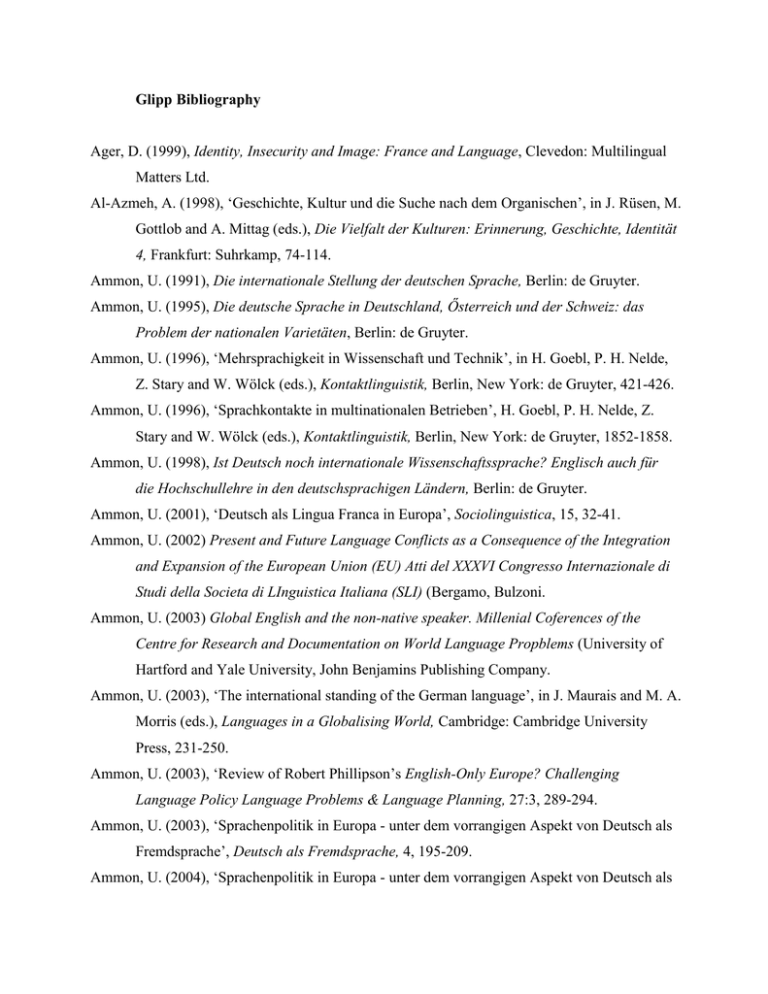
Glipp Bibliography Ager, D. (1999), Identity, Insecurity and Image: France and Language, Clevedon: Multilingual Matters Ltd. Al-Azmeh, A. (1998), ‘Geschichte, Kultur und die Suche nach dem Organischen’, in J. Rüsen, M. Gottlob and A. Mittag (eds.), Die Vielfalt der Kulturen: Erinnerung, Geschichte, Identität 4, Frankfurt: Suhrkamp, 74-114. Ammon, U. (1991), Die internationale Stellung der deutschen Sprache, Berlin: de Gruyter. Ammon, U. (1995), Die deutsche Sprache in Deutschland, Ősterreich und der Schweiz: das Problem der nationalen Varietäten, Berlin: de Gruyter. Ammon, U. (1996), ‘Mehrsprachigkeit in Wissenschaft und Technik’, in H. Goebl, P. H. Nelde, Z. Stary and W. Wölck (eds.), Kontaktlinguistik, Berlin, New York: de Gruyter, 421-426. Ammon, U. (1996), ‘Sprachkontakte in multinationalen Betrieben’, H. Goebl, P. H. Nelde, Z. Stary and W. Wölck (eds.), Kontaktlinguistik, Berlin, New York: de Gruyter, 1852-1858. Ammon, U. (1998), Ist Deutsch noch internationale Wissenschaftssprache? Englisch auch für die Hochschullehre in den deutschsprachigen Ländern, Berlin: de Gruyter. Ammon, U. (2001), ‘Deutsch als Lingua Franca in Europa’, Sociolinguistica, 15, 32-41. Ammon, U. (2002) Present and Future Language Conflicts as a Consequence of the Integration and Expansion of the European Union (EU) Atti del XXXVI Congresso Internazionale di Studi della Societa di LInguistica Italiana (SLI) (Bergamo, Bulzoni. Ammon, U. (2003) Global English and the non-native speaker. Millenial Coferences of the Centre for Research and Documentation on World Language Propblems (University of Hartford and Yale University, John Benjamins Publishing Company. Ammon, U. (2003), ‘The international standing of the German language’, in J. Maurais and M. A. Morris (eds.), Languages in a Globalising World, Cambridge: Cambridge University Press, 231-250. Ammon, U. (2003), ‘Review of Robert Phillipson’s English-Only Europe? Challenging Language Policy Language Problems & Language Planning, 27:3, 289-294. Ammon, U. (2003), ‘Sprachenpolitik in Europa - unter dem vorrangigen Aspekt von Deutsch als Fremdsprache’, Deutsch als Fremdsprache, 4, 195-209. Ammon, U. (2004), ‘Sprachenpolitik in Europa - unter dem vorrangigen Aspekt von Deutsch als Fremdsprache (II)’, Deutsch als Fremdsprache, 3-9. Ammon, U. (2007a), ‘Die Wichtigkeit und Schwierigkeit von Deutsch als Arbeitssprache in den EU-Institutionen’, Muttersprache, 11, 798-109. Ammon, U. (2007b), ‘Die Folgen der EU-Erweiterung für die deutsche Sprache - mit Hinweisen auf die Sprachenpolitik der deutschsprachigen Länder’, Sociolinguistica, 21, 128-137. Ammon, U. (2007c), ‘Sprache(n) und Globalisierung - unter besonderer Berücksichtigung der deutschen Sprache’, in U. Bechdolf, R. Johler and H. Tonn (eds.), Amerikanisierung Globalisierung. Transnationale Prozesse im europäischen Alltag, Trier: WVT Wissenschaftlicher Verlag, 141-156. Ammon, U., K. J. Mattheier, et al. (eds.) (2005), Sociolinguistica: Internationales Jahrbuch für Europäische Soziolinguistik: Wirtschaft und Sprache, Tübingen: Niemeyer. Amrusch-Hoja, M. (1994), ‘Interkulturelles Lernen - zweisprachiger Unterricht’, in D. Heindler and J. Huber (eds.), Zukunftsforum V: Sprachen lernen- Menschen verstehen: Eine Herausforderung, Wien: Bundesministerium für Unterricht und Kunst, 117-118. Anderson, B. (1991), Imagined Communities: reflections on the origins and spread of nationalism, London: Verso. Appadurai, A. (2003), ‘Disjuncture and Difference in the Global Cultural Economy’, in J. E. Braziel and A. Mannur (eds.), Theorizing Diaspora: A Reader, Oxford: Blackwell, 25-48. Armbruster, H., Rollo, Craig and Meinhof, Ulrike H. (2003), ‘Imagining Europe: everyday narratives in European border communities’, Journal of Ethnic and Migration Studies, 29:5, 885-899. Armbruster, H. and U. Meinhof (2005), ‘Story-ing East Germans Pasts. Memory Discourses and Narratives of Readjustment on the German/ Polish and former German/ German Border’, in J. Thornborrow and J. Coates (eds.), The Sociolinguistics of Narrative, Amsterdam: John Benjamins Publishing Company, 41-66. Assmann, A. and H. Friese (1998), ‘Einleitung’, in A. Assmann and H. Friese (eds.), Identitäten - Erinnerung, Geschichte, Identität 3, Franfurt: Suhrkamp, 11-23. Assmann, A. and H. Friese (eds.) (1998), Identitäten - Erinnerung, Geschichte, Identität 3, Frankfurt: Suhrkamp. Atkinson, P. and A. Coffey (1997), ‘Analysing Documentary Realities’, in D. Silverman (ed.), Qualitative Research - Theory, Method and Practice, London, Thousand Oaks, New Delhi: SAGE Publications, 25-62. Auer, P. and A. Di Luzio (eds.) (2000), The Contextualization of Language, Amsterdam: John Benjamins Publishing Company. Auer, P. and W. Li (eds.) (2007), Handbook of Multilingualism and Multilingual Communication, Berlin, New York: Mouton de Gruyter. Baker, C. (1992), Attitudes and Language, Clevedon: Multilingual Matters Ltd. Baker, C. (1997), ‘Membership Categorization and Interview Accounts’, in D. Silverman (ed.), Qualitative Research - Theory, Method and Practice, London, Thousand Oaks, New Delhi SAGE Publications, 130-143. Bakhtin, M. (1981), The Dialogic Imagination: Four Essays, Austin: University of Texas Press. Bamberg, M., A. De Fina, et al. (eds.) (2007), Selves and identities in narrative and discourse, Studies in Narrative, Amsterdam: John Benjamins Publishing Company. Barbour, S. and C. Carmichael (eds.) (2000), Language and Nationalism in Europe, Oxford: Oxford University Press. Barbour, S. and P. Stevenson (1990), Variation in German: a critical approach to German Sociolinguistics, Cambridge: Cambridge University Press. Barbour, S. and P. Stevenson (1998), Variation im Deutschen: Soziolinguistische Perspektiven, Berlin: de Gruyter. Barth, D. (2004), ‘Referential Defocusing: Dangerous Topics and Language Use in Language Biographies of East Germans’, in R. Franceschini and J. Mieczinokowski (eds.), Leben mit mehreren Sprachen — Vivre avec plusieurs langues. Sprachbiographien — Biographies langagières, Bern: Peter Lang Verlag, 75-96. Bartha, C. and A. Borbeley (2006), ‘Dimensions of linguistic otherness: prospects of minority language maintenance in Hungary’, Language Policy, 5:3, 337-365. Baszauger, I. and N. Dodier (1997 ), ‘Ethnography: Relating the Part to the Whole’, in D. Silverman (ed.), Qualitative Research: Theory, Method and Practice, Thousand Oaks, London, New Delhi: SAGE Publications, 8-23. Bauder, H. (2008), ‘Media discourse and the new German immigration law’, Journal of Ethnic and Migration Studies, 34:1, 95-112. Baumann, G. (1998), ‘Ethnische Identität als duale diskursive Konstruktion. Dominante und demotische Identitätskurse in einer multiethnischen Vorstadt von London’, in A. Assmann and H. Friese (eds.), Identitäten - Erinnerung, Geschichte, Identität 3, Frankfurt: Suhrkamp, 288-313. Baumann, R. (2000), ‘Language, identity, performance’, Pragmatics, 10:1, 1-5. Baynham, M. (2006), ‘Performing self, family and community in Moroccan narratives of migration and settlement’ in A. De Fina, D. Schiffrin and M. Bamberg (eds.), Discourse and Identity, Cambridge: Cambridge University Press, 376-397. Baynham, M. (2006/ 2003), ‘Narratives in space and time: beyond’backdrop’ accounts of narrative orientation’, Narrative Inquiry, 13:2, 347-366. Baynham, M. and A. De Fina (eds.) (2005a), Dislocations/ Relocations: Narratives of Displacement, Manchester: St. Jerome. Beneke, J. (1993), ‘Am Anfang wollten wir zueinander... . – Was wollen wir heute? Sprachlich-kommunikative Reflexionen Jugendlicher aus dem Ost- und Westteil Berlins zu einem bewegenden Zeitthema’ in R. Reiher and R. Läzer (eds.), Wer spricht das wahre Deutsch? Erkundungen zur Sprache im vereinigten Deutschland, Berlin: Aufbau Taschenbuch Verlag, 187-209. Benwell, B. and E. Stokoe (2006), Discourse and Identity, Edinburgh: Edinburgh University Press. Bhabha, H. K. (1996), ‘Culture’s In-Between’, in S. Hall and P. Du Gay (eds.), Questions of Cultural Identity, Thousand Oaks, London, New Delhi: SAGE Publications, 53-60. Bia, M. T. (2004), Towards an EU Immigration Policy: Between Emerging Supranational Principles and National Concerns), 2. Billig, M. (1985), ‘Prejudice, Categorization and Particularization: From a Perceptual to a Rhetorical Approach’, European Journal of Social Psychology, 15, 79-103. Billig, M. (1995), Banal Nationalism, Thousand Oaks, London, New Delhi: SAGE Publications. Billig, M. (1996), Arguing and Thinking. A Rhetorical Approach to Social Psychology, Cambridge: Cambridge University Press. Blackledge, A. (2005), Discourse and Power in a Multilingual World, Amsterdam: John Benjamins Publishing Company. Blackledge, A. and A. Creese (2009), Multilingualism: A Critical Perspective, London: Continuum. Blackledge, A. and A. Pavlenko (2002), ‘Introduction’, Multilingua, 21, 121-140. Block, D. (2006), Multilingual Identities in a Global City: London Stories, Basingstoke: Palgrave Macmillan. Block, D. and D. Cameron (eds.) (2001), Globalization and Language Teaching, London, New York: Routledge. Blommaert, J. (ed.) (1999a), Language Ideological Debates, Berlin, New York: Mouton de Gruyter. Blommaert, J. (1999b), ‘The debate is open’, in J. Blommaert (ed.), Language Ideological Debates, Berlin, New York: Mouton de Gruyter, 1-39. Blommaert, J. (1999c), ‘The debate is closed’, in J. Blommaert (ed.), Language ideological debates, Berlin, New York: Mouton de Gruyter, 425-439. Blommaert, J. (2003), ‘Commentary: A sociolinguistics of globalization’, Journal of Sociolinguistics, 7:4, 607-623. Blommaert, J. (2005), Discourse: A critical introduction, Cambridge: Cambridge University Press. Blommaert, J. (2006), ‘Language Policy and National Identity’, in T. Ricento (ed.), An Introduction to Language Policy, Oxford: Blackwell, 238-255. Blommaert, J., J. Collins, et al. (2005), ‘Spaces of Multilingualism’, Language & Communication, 25:3, 197-216. Blommaert, J. and J. Verschueren (1998), ‘The role of language in Eruropean nationalist ideologies’, in B. B. Schieffelin, K. A. Woolard and P. V. Kroskrity (eds.), Language Ideologies: Practice and Theory, New York: Oxford University Press, 189-210. Bommes, M. (1993), ‘Ethnizität als praktische Organisationsressource’, in M. Massarrat, H. J. Wenzel, B. Sommer and G. Szell (eds.), Die Dritte Welt und Wir. Bilanz und Perspektiven für Wissenschaft und Praxis, Freiburg: Informationszentrum Dritte Welt Boothe, B. (1998), ‘Die Biographie - ein Traum? Selbsthistorisierung im Zeitalter der Psychoanalyse’, in J. Straub (ed.), Erzählung, Identität und historisches Bewußtsein: Die psychologische Konstruktion von Zeit und Geschichte- Erinnerung, Geschichte, Identität, Frankfurt: Suhrkamp, 338-361. Braudel, F. (1958), ‘Histoire et sciences sociales: La longue durée’, ANNALES ESC., 13:4, 7-37. Briggs, C. L. and R. Baumann (1992), ‘Genre, Intertextuality, and Social Power.’ Journal of Linguistic Anthropology, 2, 131-172. Brockmeier, J. and D. Carbaugh (2001), Narrative and Identity. Studies in Autobiography, Self and Culture, Amsterdam, Philadelphia: John Benjamins Publishing Company. Brumfit, C. (2006), ‘A European Perspective on language as liminality’, in C. Mar-Molinero and P. Stevenson (eds.), Language Ideologies, Policies and Practices: Language and the future of Europe, Basingstoke: Palgrave Macmillan, 28-43. Brumlik, M. (1998), ‘Zeitbegriffe und Urteilsvermögen in der Ontogenese des Geschichtsbewußtseins’, in J. Straub (ed.), Erzählung, Identität und historisches Bewußtsein: Die psychologische Konstruktion von Zeit und Geschichte- Erinnerung, Geschichte, Identität, Frankfurt: Suhrkamp, 226-233. Bruner, J. (1987), ‘Life as Narrative’, Social Research, 54:1, 11-32. Bruner, J. (2001), ‘Self-making and world-making’, in J. Brockmeier and D. Carbaugh (eds.), Narrative and Identity. Studies in Autobiography, Self and Culture, Amsterdam, Philadelphia: John Benjamins Publishing Company, 25-37. Bruner, J. S. (1998), ‘Vergangenheit und Gegenwart als narrative Konstruktionen’, in J. Straub (ed.), Erzählung, Identität und historisches Bewußtsein: Die psychologische Konstruktion von Zeit und Geschichte- Erinnerung, Geschichte, Identität, Frankfurt: Suhrkamp, 46-80. Bruter, M. (2003), ‘Winning Hearts and Minds for Europe: The Impact of News and Symbols on Civic and Cultural European Identity’, Comparative Political Studies, 36:10, 1148-1179. Bruthiaux, P. (2003), ‘21st Century Trends in Language and Economics’, Current Issues in Language Planning, 4:1, 84-90. Brutt-Griffler, J. (2002), World English: A study of its development, Clevedon: Multilingual Matters Ltd. Bucholtz, M. and K. Hall (2004), ‘Language and Identity’, in A. Duranti (ed.), A Companion to Linguistic Anthropology, Oxford: Blackwell, 369 - 395. Burton, F. and P. Carlen (1979), Official Discourse. On Discourse Analysis, Government Publications Ideology and the State, London, Boston: Routledge and Kegan Paul Busek, E. (1998), ‘Sprache und Politik - Sprachenpolitik’, in H.-J. Krumm (ed.), Sprachen Brücken über Grenzen. Deutsch als Fremdsprache in Mittel - und Osteuropa. Dokumentation der Wiener Konferenz 17. - 21.2. 1998, Wien: eviva-Verlag, 263-270. Cahn, C. (2000), ‘Who is a German?’ SAIS Review Journal of International Affairs, 20:1, 117-124. Camartin, I. (1998), ‘Lust und Last der Mehrsprachigkeit’, in H.-J. Krumm (ed.), Sprachen Brücken über Grenzen. Deutsch als Fremdsprache in Mittel - und Osteuropa. Dokumentation der Wiener Konferenz 17. - 21.2. 1998, Wien: eviva-Verlag, 271-275. Cameron, D. (1995), Verbal Hygiene, London: Routledge. Cameron, D. (2000), Good to talk? Living and working in a communication culture, London, Thousand Oaks, CA, and New Delhi: SAGE Publications. Cameron, D. (2001), Working with Spoken Discourse, London, Thousand Oaks, CA, and New Delhi: SAGE Publications. Canagarajah, A. S. (1999), Resisting Linguistic Imperialism in English teaching, Oxford: Oxford University Press. Canagarajah, S. (ed.) (2005a), Reclaiming the Local in Language Policy and Practice, Mahway, New Jersey, London: Lawrence Erlbaum Associates. Canagarajah, S. (2005b), ‘Introduction’, in S. Canagarajah (ed.), Reclaiming the Local in Language Policy and Practice, Mahway, New Jersey, London: Lawrence Erlbaum Associates, xii - xxviiii. Canagarajah, S. (2005c), ‘Reconstructing Local Knowledge, Reconfiguring Language Studies’, in S. Canagarajah (ed.), Reclaiming the Local in Language Policy and Practice, Mahway, New Jersey, London: Lawrence Erlbaum Associates, 3-24. Canagarajah, S. (2006), ‘Ethnographic Methods in Language Policy’, in T. Ricento (ed.), An Introduction to Language Policy, Oxford: Blackwell, 153 - 170. Carl, J. and P. Stevenson (2007), ‘Being a German-speaker in Central Europe: language policies and the negotiation of identities’, in C. Fandrych and R. Salverda (eds.), Standard, Variation and Language Change in Germanic Languages, Tübingen: Gunter Narr Verlag, 91-112. Carl, J. and P. Stevenson (eds.) (2009), Language, Discourse and Identity in Central Europe: The German Language in a Multilingual Space, Basingstoke: Palgrave Macmillan. Carli, A., C. Guardiano, et al. (2003), ‘Asserting ethnic identity and power through language’, Journal of Ethnic and Migration Studies, 29:5, 865-883. Černa, K. (2009), ‘Czech-German Relationships and Identity in a Cross-Border Region’, in J. Carl and P. Stevenson (eds.), Language, Discourse and Identity in Central Europe: The German Language in a Multilingual Space, Palgrave Macmillan, 96-121. Chambers, E. (2003), ‘Applied Ethnography’, in N. K. Denzin and Y. S. Lincoln (eds.), Collecting and Interpreting Qualitative Materials Thousand Oaks, London, New Delhi: SAGE Publications, 389-417. Chambers, J. K. (1995), Sociolinguistic Theory: Linguistic Variation and its Social Significance, Oxford: Blackwell. Cink, P. (1998), ‘D-A-C-H: Sprachförderung und Zusammenarbeit aus mitteleuropäischer Perspektive’, in H.-J. Krumm (ed.), Sprachen - Brücken über Grenzen. Deutsch als Fremdsprache in Mittel - und Osteuropa, Wien: eviva-Verlag, 26-38. Clyne, P., W. F. Hanks, et al. (eds.) (1979), The Elements, Chicago: Chicago Linguistic Society. Collins, J. and S. Slembrouck (2005), ‘Multilingualism and Diasporic Populations: Spatializing Practices, Institutional Processes, and Social Hierarchies’, Language & Communication, 25:3, 189-195. Cortazzi, M. (2001), ‘Narrative Analysis in Ethnography’, in P. Atkinson, S. Delamont, A. J. Coffey and J. Lofland (eds.), Handbook of Ethnography, Thousand Oaks, London, New Delhi: SAGE Publications, 384-394. Coulmas, F. (ed.) (1991), A Language Policy for the European Community: Prospects and Quandaries, Berlin, New York: Mouton de Gruyter. Coupland, N. (2003), ‘Introduction: Sociolinguistics and Globalisation’, Journal of Sociolinguistics, 7:4. 465-472. Coupland, N. (ed.) (forthcoming), The Handbook of Language and Globalization, Oxford: Blackwell. Crowley, T. (2003), Standard English and the Politics of Language, Basingstoke: Palgrave Macmillan. Csizér, K. and J. Kormos (2008), ‘The Relationship of Intercultural contact and Language Learning Motivation among Hungarian Students of English and German’, Journal of Multilingual and Multicultural Development, 29:1, 30-48. Daftary, F. and F. Grin (eds.) (2003), Nation-Building, Etnicity and Language Politics in Transition Countries, Series on Ethnopolitics and Minority Issues, Budapest: Open Society Institute. Danet, B. and S. C. Herring (eds.) (2007), The multilingual internet: language, culture and communication online, Oxford: Oxford University Press. Davies, B. and R. Harré (1999), ‘Positioning and personhood’, in Harré and v. Langenhove (eds.), Positioning Theory: Moral Contexts of Intentional Action, Oxford: Blackwell, 32-52. De Certeau, M. (1988), The writing of history, New York: Columbia University Press. De Cillia, R., F. Menz, et al. (1998), ‘Linguistic Minorities in Austria’, in C. Paulston and D. Peckham (eds.), Linguistic Minorities in Central and Eastern Europe, Clevedon: Multilingual Matters Ltd., 18-36. De Fina, A. (2003), Identity in Narrative: A Study of Immigrant Discourse, Amsterdam: John Benjamins Publishing Company. De Fina, A. (2005b), ‘Introduction’, in A. De Fina and M. Baynham (eds.), Dislocations/ Relocations: Narratives of Displacement, Manchester: St Jerome Publishing, 1-10. De Fina, A. (2006), ‘Group identity, narrative and self-representation’, in A. De Fina, D. Schiffrin and M. Bamberg (eds.), Discourse and Identity, Cambridge: Cambridge University Press, 351-375. De Fina, A. and M. Baynham (eds.) (2005a), Dislocations/ Relocations: Narratives of Displacement, Manchester: St Jerome Publishing. De Fina, A., D. Schiffrin, et al. (eds.) (2006), Discourse and Identity, Cambridge: Cambridge University Press. De Souza, L. M. T. M. (2005), ‘The ecology of writing among the Kashinawá: indigenous multimodality in Brazil’, in S. Canagarajah (ed.), Reclaiming the Local in Language Policy and Practice, Mahway, New Jersey, London: Lawrence Erlbaum Associates, 73-95. Denzin, N. K. (1989), Interpretive Biography, London, Thousand Oaks, CA, and New Delhi: SAGE Publications. Denzin, N. K. (2003), ‘The Practices and Politics of Interpretation’, in N. K. Denzin and Y. S. Lincoln (eds.), Collecting and Interpreting Qualitative Materials, Thousand Oaks, London, New Delhi: SAGE Publications, 458-498. Denzin, N. K. and Y. S. Lincoln (eds.) (2003), The Landscape of Qualitative Research, Thousand Oaks, London, New Delhi: SAGE Publications. Denzin, N. K. and Y. S. Lincoln (eds.) (2003), Collecting and Interpreting Qualitative Materials, Thousand Oaks, London, New Delhi: SAGE Publications. Dittrich, E. J. and F.-O. Radtke (1990), ‘Einleitung: Der Beitrag der Wissenschaften zur Konstruktion ethnischer Minderheiten’, in E. J. Dittrich and F.-O. Radtke (eds.), Ethnizität. Wissenschaft und Minderheiten, Opladen: Westdeutscher Verlag, 11-40. Dörnyei, Z. and K. Csizér (2002), ‘Some Dynamics of Language Attitudes and Motivation: Results of a Longitudinal Nationwide Survey’, Applied Linguistics, 23:4, 421-462. Duchêne, A. and M. Heller (eds.) (2007), Discourses of endangerment: ideology and interest in the defence of languages, London: Continuum. Duranti, A. (ed.) (2004), A Companion to Linguistic Anthropology, Oxford: Blackwell. Duranti, A. and C. Goodwin (eds.) (1992), Rethinking Context: Language as an interactive phenomenon, Studies in the Social and Cultural Foundations of Language, Cambridge: Cambridge University Press. Eakin, P. J. (1999), How Our Lives Become Stories: Making Selves, Ithaca, London: Cornell University Press. Eckert, P. and S. McConnell-Ginet (2003), Language and Gender, Cambridge: Cambridge University Press. Edwards, V. (2004), Multilingualism in the English-speaking World, Oxford: Blackwell. Ehlich, K., J. Ossner, et al. (2000), ‘Homburger Empfehlungen zur Förderung der Europäischen Hochsprachen’, Sprachreport, 420-21. Eichinger, L. M. (1995), ‘Regionaler Sprachkontakt und fremdsprachliche Norm. Form und Verwendung der deutschen Standardsprache in Ungarn’, in R. Wodak and R. de Cillia (eds.), Sprachenpolitik in MIttel- und Osteuropa, Wien: Passagen Verlag, 53-62. Eichinger, L. M., A. Plewnia, et al. (eds.) (2008), Handbuch der deutschen Sprachminderheiten in Mittel- und Osteuropa, Tübingen: Gunter Narr Verlag. Eisenstadt, S. N. (1996), ‘Die Konstruktion nationaler Identitäten in vergleichender Perspektive’, in B. Giesen (ed.), Nationale und kulturelle Identität. Studien zur Entwicklung des kollektiven Bewußtseins in der Neuzeit, Frankfurt: Suhrkamp, 21-38. Eisenstadt, S. N. and B. Giesen (1995), ‘The Construction of Collective Identity’, European Journal of Sociology, 26:1, 72-102. Elias, N. (1996), Die Gesellschaft der Individuen, Frankfurt: Suhrkamp. Ellis, C. and L. Berger (2003), ‘Their Story/ My Story/ Our Story’, in J. F. Gubrium and J. A. Holstein (eds.), Postmodern Interviewing, Thousand Oaks, London, New Delhi: SAGE Publications, 157-183. Enyedi, A. and P. Medgyes (1998), ‘ELT in Central and Eastern Europe’, Language Teaching, 311-12. Eriksen, T. H. (1993), Ethnicity and Nationalism: Anthropological Perspectives, London: Pluto Press. Errington, J. (2001), ‘Colonial Linguistics’, Annual Review of Anthropology, 3019-39. Estel, B. (1994), ‘Grundaspekte der Nation’, in B. Estel and T. Mayer (eds.), Das Prinzip Nation in modernen Gesellschaften. Länderdiagnosen und theoretische Perspektiven, Opladen: Westdeutscher Verlag, 13-83. Estel, B. (1997), ‘Moderne Nationsverständnisse: Nation als Gemeinschaft’, in R. Hettlage, P. Deger and S. Wagner (eds.), Kollektive Identität in Krisen, Opladen: Westdeutscher Verlag, 73-85. Extra, G. and D. Gorter (eds.) (2001), The Other Languages of Europe Clevedon: Multilingual Matters Ltd. Extra, G., M. Spotti, et al. (eds.) (2009), Language Testing, Migration and Citizenship, London: Continuum. Extra, G. and K. Yağmur (eds.) (2004), Urban Multilingualism in Europe; immigrant minority languages at home and at school, Clevedon: Multilingual Matters. Fairclough, N. (1992), Discourse and Social Change, Cambridge: Polity Press. Fairclough, N. (1995), Critical Discourse Analysis, London: Longman. Fairclough, N. (2001), Language and Power, London: Longman. Fairclough, N. (2003), Analyzing Discourse, London: Routledge. Fairclough, N. (2006), Language and Globalization, London: Routledge. Fenyvesi, A. (1998), ‘Linguistic Minorities in Hungary’, in C. B. Paulston and D. Peckham (eds.), Linguistic Minorities in Central and Eastern Europe, Clevedon: Multilingual Matters Ltd., 135-159. Fine, M. and L. Weis (2003), ‘For Whom? Qualitative Research, Representations, and Social Responsibilities’, in N. K. Denzin and Y. S. Lincoln (eds.), The Landscape of Qualitative Research: Theories and Issues Thousand Oaks, London, New Delhi: SAGE Publications, 167-207. Finnegan, R. (1997), ‘Storying the Self: Personal Narratives and Identity’, in H. Mackay (ed.), Consumption and Everyday Life, Thousand Oaks, London, New Delhi: SAGE Publications, 65-111. Fix, U. (1997), ‘Die Sicht der Betroffenen. Beobachtungen zum Kommunikationswandel in den neuen Bundesländern’, Der Deutschunterricht, 134-41. Fix, U. and D. Barth (2000), Sprachbiographien: Sprache und Sprachgebrauch vor und nach der Wende von 1989 im Erinnern und Erleben von Zeitzeugen aus der DDR, Frankfurt: Peter Lang Verlag. Földes, C. (1992), ‘Überlegungen zur Problematik der Identität bei den Ungarndeutschen’, Germanistische Mitteilungen, 35/1992, 93-106. Földes, C. (2000), ‘Die deutsche Sprache im Spiegel von Werthaltungen: Eine Außenansicht’, in Kühn and Lehker (eds.), Deutsch in Europa - Muttersprache und Fremdsprache, Frankfurt: Peter Lang Verlag, 145-162. Földes, C. (2001a), ‘Deutsch in Ostmittel-, Ost- und Südosteuropa als eine Herausforderung für die Sprachenpolitik’, Deutsche Sprache, 29:4, 349-369. Földes, C. (2001b), ‘Die deutsche Sprache in Ostmittel-, Ost- und Südosteuropa: gestern, heute und morgen?’ Germanistische Mitteilungen, 53, 65-83. Földes, C. (2002), ‘Deutsch und Englisch: Ein Sprachnotstand? Befunde und Anmerkungen aus einer ostmitteleuropäischen Perspektive’, in R. Hoberg (ed.), Deutsch-Englisch-Europäisch. Impulse für eine neue Sprachpolitik, Mannheim, Leipzig, Wien, Zürich: Dudenverlag, 3, 341-367. Földes, C. (2003), ‘Deutsch als leichte und sympathische Sprache?’ in G. Stickei (ed.), Deutsch von außen, Berlin, New York: de Gruyter, 74-98. Földes, C. (2003), ‘Deutsche Sprache und Germanistik in der Slowakei als eine interkulturelle Herausforderung im östlichen Mitteleuropa’, in A. Greule and J. Meier (eds.), Deutsche Sprache in der Slowakei. Bilanz und Perspektiven ihrer Erforschung, Wien: Praesens, 9-26. Földes, C. (2004a), ‘Deutsch als Europasprache aus ungarischer Sicht’, in C. Lohse, R. Arnold and A. Greule (ed.), Die deutsche Sprache in der Europäischen Union: Rolle und Chancen aus rechts- und sprachwissenschaftlicher Sicht. Vorträge und Diskussionsbeiträge des interdisziplinären Symposiums am 18/19.9.2003 an der Universität Regensburg, Baden-Baden: Nomos, 109-128. Földes, C. (2004b), ‘Überlegungen aus der Sicht einer „Anrainer-Germanistik"‘, in D. Goltschnigg and A. Schwob (eds.), Zukunftschancen der deutschen Sprache in MIttel-, Südost- und Osteuropa. Grazer Humboldt-Kolleg, 20.-24. November 2002, Wien: Praesens, 100-105. Fontana, A. (2003), ‘Postmodern Trends in Interviewing’, in J. F. Gubrium and J. A. Holstein (eds.), Postmodern Interviewing, Thousand Oaks, London, New Delhi: SAGE Publications, 51-65. Foucault, M. (1991), ‘Governmentality’, in G. Burchell, C. Gordon and P. Miller (eds.), The Foucault Effect: Studies in Governmentality, Hemel Hempstead: Harvester Wheatsheaf, 87-104. Franceschini, R. and J. Mieczinokowski (eds.) (2004), Leben mit mehreren Sprachen: Sprachbiographien / Vivre avec plusieurs langues: Biographies langagières, Bern: Peter Lang Verlag. Friese, H. (1998), ‘Identität: Begehren, Name und Differenz’, in A. Assmann and H. Friese (eds.), Identitäten - Erinnerung, Geschichte, Identität 3, Frankfurt: Suhrkamp, 24-43. Fuchs, M. (1998), ‘Erkenntnispraxis und die Repräsentation von Differenz’, in A. Assmann and H. Friese (eds.), Identitäten - Erinnerung, Geschichte, Identität 3, Frankfurt: Suhrkamp, 105-137. Gal, S. (1979), Language Shift, New York, London: Academic Press. Gal, S. (1987), ‘Codeswitching and consciousness in the European periphery’, American Ethnologist, 14:4, 637-653. Gal, S. (1993), ‘Diversity and contestation in linguistic ideologies: German speakers in Hungary’, Language in Society, 22:3, 337-359. Gal, S. (1995), ‘Cultural bases of language use amongst German-speakers in Hungary’, International Journal of Sociology of Language, 11:1, 93-102. Gal, S. (2001), ‘Linguistic theories and national images in 19th century Hungary’, in S. Gal and K. A. Woolard (eds.), Languages and Publics. The Making of Authority, Manchester: St Jerome, 30-45. Gal, S. (2005), ‘Language Ideologies Compared: Metaphors of Public/ Private’, Journal of Linguistic Anthropology, 15:1, 23-37. Gal, S. (2006), ‘Migration, minorities and multilingualism: language ideologies in Europe’, in C. Mar-Molinero and P. Stevenson (eds.), Language Ideologies, Policies and Practices: Language and the future of Europe, Basingstoke: Palgrave Macmillan, 13-27. Gal, S. and K. Woolard (eds.) (2001a), Languages and Publics: The Making of Authority, Manchester: St. Jerome. Gal, S. and K. A. Woolard (2001b), ‘Constructing languages and publics: Authority and representation’, in S. Gal and K. A. Woolard (eds.), Constructing languages and publics: Authority and representation, Manchester: St Jerome 1-12. Galasińska, A. and D. Galasiński (2003), ‘Discursive strategies for coping with sensitive topics of the Other’, Journal of Ethnic and Migration Studies, 29:5, 849-863. Galasińska, A. and M. Krzyżanowski (eds.) (2009), Discourse and Transformation in Central and Eastern Europe, Basingstoke: Palgrave Macmillan. Garcia, O., T. Skutnabb-Kangas, et al. (eds.) (2006), Imagining Multilingual Schools: Language in Education and Globalization, Clevedon: Multilingual Matters Ltd. Gardt, A. (2000a), ‘Sprachnationalismus zwischen 1850 und 1945’, in A. Gardt (ed.), Nation und Sprache. Die Diskussion ihres Verhältnisses in Geschichte und Gegenwart, Berlin: de Gruyter, 247-273. Gardt, A. (2000b), ‘Nation und Sprache in der Zeit der Aufklärung’, in A. Gardt (ed.), Nation und Sprache. Die Diskussion ihres Verhältnisses in Geschichte und Gegenwart, Berlin: de Gruyter, 169-199. Gardt, A. and B. Hüppauf (eds.) (2004), Globalization and the Future of German, Berlin, New York: Mouton de Gruyter Garrett, P. (2005), ‘Attitude Measurement’, in U. Ammon, N. Dittmar, K. Mattheier and P. Trudgill (eds.), Sociolinguistics: An International Handbook of the Science of Language and Society, Berlin: Mouton de Gruyter, 1251-1261. Garrett, P., N. Coupland, et al. (2003), Investigating Language Attitudes: Social Meanings of Dialect, Ethnicity and Performance, Cardiff: University of Wales Press. Gellert-Novak, A. (1993), Europäische Sprachenpolitik und Europaregionen. Ergebnisse einer Befragung zur Stellung der englischen und deutschen Sprache in Grenzgebieten, Tübingen: Gunter Narr Verlag. Gellner, E. (1987), Culture, Identity and Politics, Cambridge: Cambridge University Press. Georgakopolou, A. (2007), Small Stories, Interaction and Identities, Amsterdam, Philadelphia: John Benjamins Publishing Company. Gergen, K. J. (1982), ‘The Functions and Foibles of Negotiating Self-Conception’, in M. D. Lynch, A. A. Norem-Hebeisen and K. J. Gergen (eds.), Self-Concept Advances in Theory and Research, Cambridge: Ballinger Publishing Company, 59-74. Gergen, K. J. (1994), Realities and Relationships. Soundings in Social Construction, Cambridge: Cambridge University Press. Gergen, K. J. (1998), ‘Erzählung, moralische Identität und historisches Bewußtsein. Eine sozialkonstruktionistische Darstellung’, in J. Straub (ed.), Erzählung, Identität und historisches Bewußtsein: Die psychologische Konstruktion von Zeit und GeschichteErinnerung, Geschichte, Identität 1, Frankfurt: Suhrkamp, 170-202. Gergen, M. M. and K. J. Gergen (2003), ‘Qualitative Inquiry: Tensions and Transformations’, in N. K. Denzin and Y. S. Lincoln (eds.), The Landscape of Qualitative Research: Theories and Issues, Thousand Oaks, London, New Delhi: SAGE Publications, 575-610. Geulen, C. (1998), ‘Die Metamorphose der Identität. Zur „Langlebigkeit“ des Nationalismus’, in A. Assmann and H. Friese (eds.), Identitäten - Erinnerung, Geschichte, Identität 3, Frankfurt: Suhrkamp, 346-373. Giampapa, F. (2004), ‘The politics of identity, representation, and the discourses of self-identification: negotiating the periphery and the centre’, in A. Pavlenko and A. Blackledge (eds.), Negotiation of Identities in Multilingual Contexts, Clevedon: Multilingual Matters Ltd., 192-218. Giles, H., N. Coupland, et al. (eds.) (1991), Contexts of Accommodation: Developments in Applied Linguistics, Cambridge: Cambridge University Press. Giles, H. and R. St. Clair (1979), Language and Social Psychology, Oxford: Blackwell. Gillis, J. R. (1994), ‘Memory and Identity: The History of a Relationship’, in J. R. Gillis (ed.), Commemorations. The Politics of National Identity, Princeton: Princeton University Press, 3-27. Giordano, C. (1997), ‘Ethnizität: Prozesse und Diskurse im interkulturellen Vergleich’, in R. Hettlage, P. Deger and S. Wagner (eds.), Kollektive Identität in Krisen, Opladen: Westdeutscher Verlag, 56-87. Glück, H. (2000), ‘Die Stellung der deutschen Sprache in Europa am Ende des 20. Jahrhunderts’, in Kühn and Lehker (eds.), Deutsch in Europa - Muttersprache und Fremdsprache, Frankfurt: Peter Lang Verlag, 9-21. Goebl, H., P. H. Nelde, et al. (eds.) (1996 ), Kontaktlinguistik, Berlin, New York: de Gruyter. Goffman, I. (1981), Forms of Talk, Pennsylvania: University of Pennsylvania Press. Graddol, D. (1997), The Future of English. A guide to forecasting the popularity of the English language in the 21st century, London: British Council. Graddol, D., J. Cheshire, et al. (1994), Describing Language, Buckingham, Bristol, PA: Open University Press. Graumann, C. F. (1999), ‘Soziale Identitäten. Manifestation sozialer Differenzierung und Identifikation’, in R. Viehoff and R. T. Segers (eds.), Kultur, Identität, Europa: Über die Schwierigkeiten und Möglichkeiten einer Konstruktion, Frankfurt: Suhrkamp, 59-74. Grin, F. (2003), Language Policy Evaluation and the European Charter on Regional or Minority Languages, Basingstoke: Palgrave Macmillan. Grin, F. (2006), ‘Economic Considerations in Language Policy’, in T. Ricento (ed.), An Introduction to Language Policy Theory and Method, Oxford: Blackwell, 77-94. Grossberg, L. (1996), ‘Identity and Cultural Studies: Is that all there is?’ in S. Hall and P. du Gray (eds.), Questions of Cultural Identity, Thousand Oaks, London, New Delhi: SAGE Publications, 87-107. Grzymala-Busse, A. (2003), ‘Political Competition and the Politicization of the State in East Central Europe’, Comparative Political Studies, 36:10, 1123-1147. Gubrium, J. F. and J. A. Holstein (eds.) (2003), Postmodern Interviewing, Thousand Oaks, London, New Delhi: SAGE Publications. Hannerz, U. (1992), Cultural Complexity: Studies in the Social Organization of Meaning, New York: Columbia University Press. Hannerz, U. (1996), Transnational Connections: Culture, People, Places, London, New York: Routledge. Harré, R. and L. van Langenhove (eds.) (1999), Positioning Theory: Moral Contexts of Intentional Action, Oxford: Blackwell. Harris, R. (1990), ‘On redefining Linguistics’, in H. Davis and T. Taylor (eds.), Redefining Linguistics, London: Routledge, 18-52. Haugen, E. (1972), The Ecology of Language, Stanford: Stanford University Press. Heath, C. (1997), ‘The Analysis of Activities in Face to Face Interaction Using Video’, in D. Silverman (ed.), Qualitative Research - Theory, Method and Practice, London, Thousand Oaks, New Delhi: SAGE Publications, 183-200. Heckmann, F. (1991), ‘Ethnos, Demos und Nation, oder: Woher stammt die Intoleranz des Nationalstaats gegenüber ethnischen Minderheiten?’ in U. Bielefeld (ed.), Das Eigene und das Fremde. Neuer Rassismus in der Alten Welt, Hamburg: Junius, 51-78. Heckmann, F. (1992), Ethnische Minderheiten, Volk und Nation. Soziologie interethnischer Beziehungen, Stuttgart: Enke Verlag. Heckmann, F. (1997), ‘Ethnos- eine imaginierte oder reale Gruppe? Über Ethnizität als soziologische Kategorie’, in R. Hettlage, P. Deger and S. Wagner (eds.), Kollektive Identität in Krisen Opladen: Westdeutscher Verlag, 46-55. Hedetoft, U. (1995), Signs of Nations. Studies on the Political Semiotics and Self and Other in Contemporary European Nationalism, Aldershot: Dartmouth. Heller, M. (2003), ‘Globalization, the new economy, and the commodification of language and identity’, Journal of Sociolinguistics, 7:4, 473-492. Heller, M. (2006), Linguistic Minorities and Modernity: A sociolinguistic ethnography, London: Continuum. Heller, M. (ed.) (2007), Bilingualism: A Social Approach, Basingstoke: Palgrave Macmillan. Heller, M. and M. Martin-Jones (eds.) (2001), Voices of Authority: Education and Linguistic Difference, Westport, CT: Ablex Publishing Corporation. Hellmann, M. and M. Schröder (eds.) (2008), Sprache und Kommunikation in Deutschland Ost und West. Ein Reader zu fünfzig Jahren Forschung, Hildesheim: Georg Olms Verlag. Herder, J. G. (1770/1966), Abhandlung über den Ursprung der Sprache. Engl. translation Essay on the Origin of Language, Munich, Engl. translation London: Hanser, Engl. translation University of Chicago Press. Heritage, J. (1997), ‘Conversation Analysis and Institutional Talk: Analysing Data’, in D. Silverman (ed.), Qualitative Research - Theory, Method and Practice, London, Thousand Oaks, New Delhi: SAGE Publications, 161-182. Hessky, R. (1995), ‘Die Rolle der großen Verkehrssprachen in Ostmitteleuropa am Beispiel Ungarn’, in R. Wodak and R. De Cillia (eds.), Sprachenpolitik in Mittel- und Osteuropa Wien: Passagen Verlag, 63-74. Hessky, R. (1996), ‘Ungarisch-Deutsch’, Kontaktlinguistik, 1, 1723-1731. Hinton, P. (2000), Stereotypes, Cognition and Culture, Hove: Psychology Press. Hodder (2003), ‘The Interpretation of Documents and Material Culture’, in N. K. Denzin and Y. S. Lincoln (eds.), Collecting and Interpreting Qualitative Materials Thousand Oaks, London, New Delhi: SAGE Publications, 155-175. Hoerder, D. (2002), ‘The German-Language Diasporas: A Survey, Critique, and Interpretation’, Diaspora, 11:1, 7-44. Hoffmann, H. (1998), ‘Sprache und Kultur’, in H.-J. Krumm (ed.), Sprachen - Brücken über Grenzen. Deutsch als Fremdsprache in Mittel - und Osteuropa, Wien: eviva-Verlag, 258-262. Hoffmann, H. (2000), ‘Das Goethe-Institut als Mittler deutscher Sprache und Kultur’, in A. Gardt (ed.), Sprache und Nation. Die Diskussion ihres Verhältnisses in Geschichte und Gegenwart, Berlin: Walter de Gruyter. Hogan-Brun, G. (ed.) (2000), National Varieties of German outside Germany, German Linguistic and Cultural Studies, Bern: Peter Lang Verlag. Hogan-Brun, G., C. Mar-Molinero, et al. (eds.) (2009), Discourses on Language and Integration: critical perspectives on language testing regimes in Europe, Amsterdam: John Benjamins Publishing Company. Hogan-Brun, G. and S. Wolff (eds.) (2003), Minority Languages in Europe, Basingstoke: Palgrave Macmillan. Hogan-Brun, G. and S. Wolff (2003), ‘Minority Languages in Europe: An Introduction to the Current Debate’, in G. Hogan-Brun and S. Wolff (eds.), Minority Languages in Europe, Basingstoke: Palgrave Macmillan, 3-15. Hogg, M. A. (1992), The Social Psychology of Group Cohesiveness. From Attraction to Social Identity, New York, London, Toronto, Sydney, Tokyo Singapore: Harvester Wheatsheaf. Hogg, M. A. and D. Abrams (1988), Social Identifications: A Social Psychology of Intergroup Relations and Group Processes, London: Routledge. Holly, W., Nekvapil, Jiří, Scherm, Ilona and Tišerová, Pavla (2003), ‘Unequal neighbours: coping with assymmetries’, Journal of Ethnic and Migration Studies, 29:5, 819-834. Holstein, J. A. and J. F. Gubrium (1997), ‘Active Interviewing’, in D. Silverman (ed.), Qualitative Research: Theory, Method and Practice London, Thousand Oaks, CA, and New Delhi SAGE Publications, 113-129. Hornberger, N. H. (2006), ‘Frameworks and Models in Language Policy and Planning’, in T. Ricento (ed.), An Introduction to Language Policy: Theory and Method, Oxford: Blackwell, 24-42. Hüppauf, B. (2004), ‘Globalization - threats and opportunites’, in A. Gardt and B. Hüppauf (eds.), Globalization and the Future of German, Berlin, New York: de Gruyter, 3-24. Hymes, D. (1996), Ethnography, Linguistics, Narrative Inequality. Toward an Understanding of Voice, London, Bristol, PA: Taylor & Francis Ltd. Ikenberry, G. J. (1990), ‘Socialization and Hegemonic Power’, International Organization, 44:3. Irvine, J. T. (1989), ‘When talk isn’t cheap’, American Ethnologist, 16:2, 248-267. Irvine, J. T. and S. Gal (2000), ‘Language ideology and linguistic differentiation’, in P. Kroskrity (ed.), Regimes of Language: Ideologies, Policies, and Identities, Santa Fe: School of American Research Press, 35-83. Jaworska, S. (2009), ‘The German Language in Poland: the Eternal Foe and the Wars on Words’, in J. Carl and P. Stevenson (eds.), Language, Discourse and Identity in Central Europe. The German language in multilingual space, Basingstoke: Palgrave Macmillan, 51-72. Jaworski, A. and N. Coupland (eds.) (1999a), The Discourse Reader, London: Routledge. Jaworski, A. and N. Coupland (1999b), ‘Introduction: Perspectives on Discourse Analysis’, in A. Jaworski and N. Coupland (eds.), The Discourse Reader, London: Routledge, 1-39. Jenkins, J. (2007), English as a Lingua Franca: attitude and identity, Oxford: Oxford University Press. Johnson, S. (2005), Spelling Trouble? Language, ideology and the reform of German orthography, Clevedon: Multilingual Matters Ltd. Joseph, J. E. (1987), Eloquence and power. The rise of language standards and standard languages, London: Frances Pinter Publishers. Joseph, J. E. (2004), Language and Identity Basingstoke: Palgrave Macmillan. Joseph, J. E. (2004), ‘Linguistic identity and the limits of global English’, in A. Duszek and U. Okulske (eds.), Speaking from the Margin: Global English from a European Perspective, Frankfurt: Peter Lang Verlag, 17-33. Kamusella, T. (2009), The Politics of Language and Nationalism in Modern Central Europe, Basingstoke: Palgrave Macmillan. Kiss, E. (1997), ‘Ein Versuch, den post-sozialistischen Nationalismus zu interpretieren’, in R. Hettlage, P. Deger and S. Wagner (eds.), Kollektive Identität in Krisen, Opladen: Westdeutscher Verlag, 194-205. Klusmeyer, D. B. (2000), ‘Four Dimensions of Membership in Germany’, SAIS Review Journal of International Affairs, XX:1, 1-21. Knipf-Komlósi, E. (2008), ‘Ungarn’, in L. M. Eichinger, A. Plewnia and C. M. Riehl (eds.), Handbuch der deutschen Sprachminderheiten in Mittel- und Osteuropa, Tübingen: Gunter Narr Verlag, 265-329. Kohl, K.-H. (1998), ‘Ethnizität und Tradition aus ethnologischer Sicht’, in A. Assmann and H. Friese (eds.), Identitäten - Erinnerung, Geschichte, Identität 3, Frankfurt: Suhrkamp, 269-287. Kontra, M. (1996), ‘Hungary’, in H. Goebl, P. H. Nelde, Z. Stary and W. Wölck (eds.), Kontaktlinguistik, Berlin, New York: de Gruyter, 1708-1723. Kontra, M., R. Phillipson, et al. (eds.) (1999), Language: A Right and a Resource. Approaching Linguistic Human Rights, Budapest, New York: Central European University Press. Kroskrity, P. (ed.) (2000a), Regimes of Language: Ideologies, Policies and Identities, Santa Fe: School of American Research Press. Kroskrity, P. (2000b), ‘Regimenting languages: language ideological perspectives’, in P. Kroskrity (ed.), Regimes of Language: Ideologies, Policies, and Identities, Santa Fe: School of American Research Press, 1-34. Kroskrity, P. V. (2004), ‘Language Ideologies’, in A. Duranti (ed.), A Companion to Linguistic Anthropology, Oxford: Blackwell, 496-518. Krumm, H.-J. (1998), ‘Die deutsche Sprache - eine Brückensprache für Mittel- und Osteuropa?’ in H.-J. Krumm (ed.), Sprachen - Brücken über Grenzen. Deutsch als Fremdsprache in Mittel - und Osteuropa, Wien: eviva-Verlag, 39-53. Krumm, H.-J. (1998), ‘Nachbarsprachen - eine Herausforderung für die monolinguale Einstellung der Bildungssysteme und den traditionellen Fremdsprachenunterricht’, in H.-J. Krumm (ed.), Die Sprachen unserer Nachbarn - Unsere Sprachen. Chancen zur Diversifizierung des Sprachenangebots im Zuge der EU-Erweiterung, Wien: eviva-Verlag, 115-127. Krzyżanowski, M. and R. Wodak (2007), ‘Multiple Identities, Migration and Belonging:’Voices of Migrants’’, in C.-R. Caldas-Coulthard and R. Iedema (eds.), Identity Trouble: Critical Discourse and Contestations of Identification, Basingstoke: Palgrave Macmillan, 95-119. Kugler, H., A. Redder, et al. (1999), ‘Tutzinger Thesen zur Sprachenpolitik’, Sprachreport, 415-16. Kymlicka, W. (1995), Multicultural Citizenship: A liberal theory of minority rights, Oxford: Oxford University Press. Kymlicka, W. (1995), Politics in the Vernacular: Nationalism, Multiculturalism and Citizenship, Oxford: Oxford University Press. Kymlicka, W. and A. Patten (eds.) (2003), Language Rights and Political Theory, Oxford: Oxford University Press. Labov, W. and J. Waletzky (1967), ‘Narrative Analysis: Oral Versions of Personal Experience’, Journal of Narrative and Life History, 7:1-4, 3-38. Langer, N. and W. Davies (2006), The making of bad language: lay linguistic stigmatisations in German: past and present, Frankfurt: Peter Lang Verlag. Langer, N. and W.V. Davies. (eds.) (2005), Linguistic Purism in the Germanic Languages, Berlin: Walter de Gruyter. Le Page, R. and A. Tabouret-Keller (1985), Acts of identity: Creole-based approaches to language and ethnicity, Cambridge, New York: Cambridge University Press. Lefkowitz, D. (2004), Words and Stones: The Politics of Language and Identity in Israel, Oxford: Oxford University Press. Leggewie, C. (1994), ‘Ethnizität, Nationalismus und Multikulturelle Gesellschaft’, in H. Berding (ed.), Nationales Bewußtsein und kollektive Identität. Studien zur Entwicklung des kollektiven Bewußtseins in der Neuzeit 2, Frankfurt: Suhrkamp, 46-65. Lenhardt, G. (1990), ‘Ethnische Identität und sozialwissenschaftlicher Instrumentalismus’, in E. J. Dittrich and F.-O. Radtke (eds.), Ethnizität. Wissenschaft und Minderheiten, Opladen: Westdeutscher Verlag, 191-213. Lewis, M. and J. Brooks-Gunn (1982), ‘The Self as Social Knowledge’, in M. D. Lynch, A. A. Norem-Hebeisen and K. J. Gergen (eds.), Self-Concept. Advances in Theory and Research, Cambridge, MASS: Ballinger Publishing Company, 101-118. Liebscher, G. and J. Dailey-O’ Cain (2005), ‘West Germans moving East. Place, Political Space, and Positioning in Conversational Narratives’, in A. De Fina and M. Baynham (eds.), Dislocations/ Relocations: Narratives of Displacement, Manchester: St Jerome Publishing, 61-85. Linde, C. (1993), Life Stories: The Creation of Coherence, NY, Oxford: Oxford University Press. Lipowatz, T. (1998), Politik der Psyche: Eine Einführung in die Psychopathologie des Politischen, Wien: Turia und Kant. Lipp, W. (1994), ‘Regionen, Multikulturalismus und Europa: Jenseits der Nation?’ in B. Estel and T. Mayer (eds.), Das Prinzip Nation in modernen Gesellschaften. Länderdiagnosen und theoretische Perspektiven, Opladen: Westdeutscher Verlag, 57-77. Lohse, C., R. Arnold, et al. (eds.) (2004), Die deutsche Sprache in der Europäischen Union: Rolle und Chancen aus rechts- und sprachwissentschaftlicher Sicht, Baden-Baden: Nomos. Lowenthal, D. (1994), ‘Identity, Heritage, and History’, in J. R. Gillis (ed.), Commemorations. The Politics of National Identity, Princeton: Princeton University Press, 27-40. Mac Giolla Chríost, D. (2007), Language and the City, Basingstoke: Palgrave Macmillan. Mackey, W. F. (2001), ‘Conflicting Languages in a United Europe’, Sociolingusitica, 151-17. Maier, M. (1995), ‘Die Sprachsituation in Tschechien am Ende des 20. Jahrhunderts’, in R. Wodak and R. De Cillia (eds.), Sprachenpolitik in Mittel- und Osteuropa, Wien: Passagen Verlag, 75-82. Maitz, P. (2005), Sozialpsychologie des Sprachverhaltens. Der deutsch-ungarische Sprachkonflikt in der Habsburgermonarchie, Tübingen: Niemeyer. Maitz, P. (2008), ‘Linguistic Nationalism in nineteenth-century Hungary. Reconstructing a linguistic ideology’, Journal of Historical Pragmatics, 9:1, 20-47. Maitz, P. and K. Sándor (2009), ‘Changes in the Linguistic Marketplace: The Case of German in Hungary’, in J. Carl and P. Stevenson (eds.), Language, Discourse and Identity in Central Europe : The German Language in a Multilingual Space, Basingstoke: Palgrave Macmillan, 149-164. Makoni, S. and A. Pennycook (eds.) (2007), Disinventing and Reconstituting Language, Clevedon: Multilingual Matters Ltd. Marais, J. and M. Morris (eds.) (2003), Languages in a Globalising World, Cambridge: Cambridge University Press. Mar-Molinero, C. (2000), The Politics of Language in the Spanish-speaking World, London: Routledge. Mar-Molinero, C. (2006), ‘The European Linguistic Legacy in a Global Era: Linguistic Imperialism, Spanish and the Instituto Cervantes’, in C. Mar-Molinero and P. Stevenson (eds.), Language Ideologies, Policies and Practices: Language and the Future of Europe, Basingstoke: Palgrave Macmillan, 76-91. Mar-Molinero, C. and P. Stevenson (eds.) (2006a), Language Ideologies, Policies and Practices: Language and the future of Europe, Basingstoke: Palgrave Macmillan. Mar-Molinero, C. and P. Stevenson (2006b), ‘Language Policy in a Changing Europe’, Language Policy, 5:3, 239-245. Mar-Molinero, C. and M. Stewart (eds.) (2006), Globalization and Language in the Spanish-speaking World: Macro and Micro Perspectives, Basingstoke: Palgrave Macmillan. Maurais, J. (2003b), ‘Towards a new linguistic world order’, in J. Maurais and M. A. Morris (eds.), Languages in a Globalising World, Cambridge: Cambridge University Press, 13-36. Maurais, J. and M. A. Morris (eds.) (2003a), Languages in a Globalising World, Cambridge: Cambridge University Press. May, S. (2001), Language and Minority Rights: Ethnicity, Nationalism and the Politics of Language, Harlow, New York: Longman. May, S. (2003), ‘Language, Nationalism and Democracy in Europe’, in Hogan-Brun, G. and S. Wolff (eds.), Minority Languages in Europe, Basingstoke: Palgrave Macmillan, 211-232 May, S. (2006), ‘Language Policy and Minority Rights’, in T. Ricento (ed.), An Introduction to Language Policy: Theory and Method, Oxford: Blackwell, 255-273. May, S. and N. H. Hornberger (eds.) (2008), Language Policy and Political Issues in Education, Encyclopedia of Language and Education, New York: Springer. Medgyes, P. and K. Miklósy (2000), ‘The language situation in Hungary’, Current Issues in Language Planning, 1:2, 148-242. Meinhof, U. and A. Triandafyllidou (eds.) (2006), Transcultural Europe. Cultural Policy in the Changing European Space, Basingstoke: Palgrave Macmillan. Meinhof, U. H. (2003), ‘Migration borders: an introduction to European identity construction in process’, Journal of Ethnic and Migration Studies, 29:5, 781-796. Meinhof, U. H. and D. Galasiński (2005), The Language of Belonging, Basingstoke: Palgrave Macmillan. Mennell, S. (1994), ‘The Formation of We-Images: A Process Theory’, in C. Calhoun (ed.), Social Theory and the Politics of Identity, Oxford: Blackwell, 175-197. Meyerhoff, M. (2002), ‘Community of Practice’, in J. K. Chambers, P. Trudgill and N. Schilling-Estes (eds.), The Handbook of Language Variation and Change, Oxford: Blackwell, 526-549. Millar McColl, R. (2005), Language, Nation and Power: An Introduction, Basingstoke: Palgrave Macmillan. Miller, G. (1997), ‘Building Bridges: The Possibility of Analytic Dialogue Between Ethnography, Conversation Analysis and Foucault’, in D. Silverman (ed.), Qualitative Research Theory, Method and Practice, London, Thousand Oaks, New Delhi: SAGE Publications, 24-44. Miller, J. and B. Glassner (1997), ‘The ‘Inside’ and the ‘Outside’: Finding Realities in Interviews’, in D. Silverman (ed.), Qualitative Research - Theory, Method and Practice, London, Thousand Oaks, New Delhi: SAGE Publications, 99-112. Mills, J. (2004), ‘Mothers and mother-tongue: perspectives on self-construction by mothers of Pakistani heritage’, in A. Pavlenko and A. Blackledge (eds.), Negotiation of Identities in Multilingual Contexts, Clevedon: Multilingual Matters Ltd., 161-191. Mirdal, G. M. and L. Ryynänen-Karjalainen (2004) Migration and Transcultural Identities: Forward Look Report, European Science Foundation Mishler, E. (2006), ‘Narrative and Identity: The double arrow of time’, in A. De Fina, D. Schiffrin and M. Bamberg (eds.), Discourse and Identity, Cambridge: Cambridge University Press, 30-47. Modan, G. G. (2007), Turf Wars. Discourse, Diversity, and the Politics of Place, Oxford: Blackwell. Moghaddam, F. M. (1998), Social Psychology. Exploring Universals Across Cultures, New York: W.H. Freeman. Moghaddam, F. M. (1999), ‘Reflexive positioning: culture and private discourse’, in R. Harré and L. van Langenhove (eds.), Positioning Theory: Moral Contexts of Intentional Action, Oxford: Blackwell, 74-86. Mommsen, H. (1993), ‘Die habsburgische Nationalitätenfrage und ihre Lösungsversuche im Licht der Gegenwart’, in H.-A. Winkler and H. Kaelble (eds.), NationalismusNationalitäten- Supranationalität, Stuttgart: Klett-Cotta, 108-122. Moore, H. (1996), ‘Language Policies as Virtual Realities: Two Australian Examples’, TESOL Quarterly, 30:3, 473-497. Morley, D. and K. Robins (1995), Spaces of Identity. Global Media, Electronic Landscapes and Cultural Boundaries, London: Routledge. Mühlhäusler, P. (1996), Linguistic Ecology. Language change and linguistic imperialism in the Pacific region, London: Routledge. Muhr, R. (1995), ‘Die österreichische Sprach- und Kulturpolitik im neuen politischen Kontext nach 1989’, in R. Wodak and R. De Cillia (eds.), Sprachenpolitik in Mittel- und Osteuropa, Wien: Passagen Verlag, 83-91. Narayan, K. and K. M. George (2003), ‘Personal and Folk Narrative as Cultural Representation’, in J. F. Gubrium and J. A. Holstein (eds.), Postmodern Interviewing, Thousand Oaks, London, New Delhi: SAGE Publications, 123-139. Nekula, M., Nekvapil Jiri & Sichova, Katerina (2005), ‘Sprachen in multinationalen Unternehmen auf dem Gebiet der Tschechischen Republik’, Forost Arbeitspapiere: Forschungsverbund Ost- und Südosteuropa, 31. Nekula, M. (2006), ‘Franz Kafkas Sprachen und Identitäten’, in M. Nekula and W. Koschmal (eds.), Sonderdruck aus: Juden zwischen Deutschen und Tschechen- Sprachliche und kulturelle Identitäten in Böhmen 1800-1945, München: R. Oldenbourg Verlag, 125-149. Nekula, M. (2007), ‘The Divided City: Prague’s Public Space and Franz Kafka’s Readings of Prague’, in M. Nekula, I. Fleischmann and A. Greule (eds.), Franz Kafka im sprachnationalen Kontext seiner Zeit. Sprache und nationale Identität in den öffentlichen Institutionen der böhmischen Länder, Weimar: Böhlau, 85-106. Nekula, M., J. Nekvapil, et al. (2005), ‘Sprachen in deutsch- tschechischen, österreichisch-tschechischen und schweizerisch-tschechischen Unternehmen: Ein Beitrag zur Wirtschaftskommunikation in der Tschechischen Republik’, Sociolinguistica, 19, 128-143. Nekvapil, J. (1997), ‘Die kommunikative Überwindung der tschechisch-deutschen ethnischen Polarisation. Deutsche, deutsche Kollegen, Expatriates und andere soziale Kategorien im Automobilwerk Škoda’, in S. Höhne and M. Nekula (eds.), Sprache, Wirtschaft, Kultur. Deutsche und Tschechen in Interaktion, München: Iudicium, 127-144. Nekvapil, J. (2000), ‘On non-self-evident relationships between language and ethnicity: How Germans do not speak German, and Czechs do not speak Czech’, Multilingua, 19, 37-53. Nekvapil, J. (2001), ‘Aus biographischen Erzählungen in der Familie des Herrn und der Frau S.: Sprachbiographien tschechischer Deutscher’, in T. Keller and F. Raphael (eds.), Biographien im Plural. Interkulturität, Paare, Inszenierung. Sprache - Literatur – Gesellschaft, Strasbourg: Strasbourg University Press, 239-262. Nekvapil, J. (2003), ‘Language biographies and the analysis of language situations: on the life of the German community in the Czech Republic’, International Journal of Sociology of Language, 16:2, 63-83. Nekvapil, J. (2004), ‘Language Biographies and Management Summaries’, Language Management in Contact Situations, III:104, 9-33. Nekvapil, J. and M. Nekula (2006), ‘On Language Management in Multinational Companies in the Czech Republic’, Current Issues in Language Planning, 7:2&3, 307-327. Nekvapil, J. and J. Neustupny (1998), ‘Linguistic communities in the Czech Republic’, in C. B. Paulston and D. Peckham (eds.), Linguistic Minorities in Central and Eastern Europe, Clevedon: Multilingual Matters Ltd., 116-134. Nekvapil, J. and T. Shermann (2009), ‘Czech, German and English: Finding Their Place in Multinational Companies in the Czech Republic’, in J. Carl and P. Stevenson (eds.), Language, Discourse and Identity in Central Europe. The German language in multilingual space, Basingstoke: Palgrave Macmillan, 122-148. Nemeth, C. J. (1986), ‘Intergroup Relations Between Majority and Minority’, in S. Worchel and W. G. Austin (eds.), Psychology of Intergroup Relations, Chicago: Nelson Hall, 229-243. Neustupný, J. and J. Nekvapil (2003), ‘Language Management in the Czech Republic’, Current Issues in Language Planning, 4 3&4, 181-366. Nic Craith, M. (2006), Europe and the Politics of Language, Basingstoke: Palgrave Macmillan. Ochs, E. and L. Capps (2001), Living Narrative: Creating Lives in Everyday Storytelling, Cambridge: Harvard University Press. Ohliger, R. and R. Münz (2002), ‘Minorities into Migrants: Making and Un-Making Central and Eastern Europe’s Ethnic German Diasporas’, Diaspora, 11:1, 45-83. Oommen, T. K. (1997), Citizenship, Nationality and Ethnicity. Reconciling Competing Identitie,s Cambridge: Polity Press. O’Reilly, C. (ed.) (2001), Language, Ethnicity and the State: Minority Languages in Central and Eastern Europe, Basingstoke: Palgrave Macmillan. O’Reilly, C. C. (2003), ‘When a Language is’Just Symbolic’: Reconsidering the Significance of Language to the Politics of Identity’, in G. Hogan-Brun and S. Wolff (eds.), Minority Languages in Europe, Basingstoke: Palgrave Macmillan, 16-33. Parker, I. (1990), ‘Discourse: Definitions and Contradictions’, Philosophical Psychology, 3:2&3, 187-204. Patrick, P. L. (2002), ‘The Speech Community’, in J. K. Chambers, P. Trudgill and N. Schilling-Estes (eds.), The Handbook of Language Variation and Change, Oxford: Blackwell, 573-599. Paulston, C. B. (1998), ‘Linguistic Minorities in Central and Eastern Europe: An Introduction’, in C. B. Paulston and D. Peckham (eds.), Linguistic Minorities in Central and Eastern Europe, Clevedon: Multilingual Matters Ltd., 1-17. Pavlenko, A. (2003), ‘‘Language of the Enemy’: Foreign Language Education and National Identity’, International Journal of Bilingual Education and Bilingualism, 6:5, 313-331. Pavlenko, A. (2007), ‘Autobiographic Narratives as Data in Applied Linguistics’, Applied Linguistics, 28:2, 163-188. Pavlenko, A. and A. Blackledge (eds.) (2004a), Negotiation of Identities in Multilingual Contexts, Clevedon: Multilingual Matters Ltd. Pavlenko, A. and A. Blackledge (2004b), ‘Introduction: new theoretical approaches to the study of negotiation of identities in multilingual contexts’, in A. Pavlenko and A. Blackledge (eds.), Negotiation of Identities In Multilingual Contexts, Clevedon: Multilingual Matters Ltd., 1-33. Pennycook, A. (1994), The Cultural Politics of English as an International Language, London: Longman. Pennycook, A. (1998), English and the Discourses of Colonialism, London: Routledge. Pennycook, A. (2006), ‘Postmodernism in Language Policy’, in T. Ricento (ed.), An Introduction to Language Policy Theory and Method Oxford: Blackwell, 60-76. Pennycook, A. (2007), Global Englishes and Transcultural Flows, London: Routledge. Peräkylä, A. (1997), ‘Reliability and Validity in Research Based on Transcripts’, in D. Silverman (ed.), Qualitative Research - Theory, Method and Practice, London, Thousand Oaks, New Delhi: SAGE Publications, 201-220. Pertot, S., T. M. S. Priestly, et al. (eds.) (2008), Rights, Promotion and Integration Issues for Minority Languages in Europe, Basingstoke: Palgrave Macmillan. Phillipson, R. (1992), Linguistic Imperialism, Oxford: Oxford University Press. Phillipson, R. (2003), English-only Europe? Challenging Language Policy, London: Routledge. Phillipson, R. (2007), ‘English in Europe: Threat or Promise?’ in M. Nic Craith (ed.), Language, Power and Identity Politics, Basingstoke: Palgrave Macmillan, 65-83. Piller, I. (2001), ‘Naturalisation, Language Testing and its Basis in Ideologies of National Identity and Citizenship’, International Journal of Bilingualism, 5:3, 259-277. Plummer, K. (2001), ‘The Call of Life Stories in Ethnographic Research’, in P. Atkinson, S. Delamont, A. J. Coffey and J. Lofland (eds.), Handbook of Ethnography, London: SAGE Publications, 395-406. Polkinghorne, D. E. (1998), ‘Narrative Psychologie und Geschichtsbewußtsein. Beziehungen und Perspektiven’, in J. Straub (ed.), Erzählung, Identität und historisches Bewußtsein: Die psychologische Konstruktion von Zeit und Geschichte- Erinnerung, Geschichte, Identität 1, Frankfurt: Suhrkamp, 12-45. Potter, J. (1997), ‘Discourse Analysis as a Way of Analysing Naturally Occurring Talk’, in D. Silverman (ed.), Qualitative Research - Theory, Method and Practice, London, Thousand Oaks, New Delhi: SAGE Publications, 144-160. Povejšil, J. (1996), ‘Tschechisch-Deutsch’, in Goebl, H., P. H. Nelde, Z. Stary and W. Wölck (eds.), Kontaktlinguistik, Berlin: de Gruyter, 1656-62. Prior, L. (1997), ‘Following in Foucault’s Footsteps: Text und Context in Qualitative Research’, in D. Silverman (ed.), Qualitative Research - Theory, Method and Practice, London, Thousand Oaks, New Delhi: SAGE Publications, 63-79. Reisigl, M. (2008), ‘Analyzing Political Rhetoric’, in Wodak, R. and M. Krzyżanowski (eds.), Qualitative Discourse Analysis in the Social Sciences, Basingstoke: Palgrave Macmillan, 96-120. Reisigl, M. and R. Wodak (2009), ‘The discourse-historical approach (DHA)’, in Wodak, R. and M. Meyer (eds.), Methods of Critical Discourse Analysis, Los Angeles et al.: Sage, 87-121. Relaño-Pastor, A. M. and A. De Fina (2005), ‘Contesting Social Place. Narratives of Language Conflict’, in A. De Fina and M. Baynham (eds.), Dislocations/ Relocations: Narratives of Displacement, Manchester: St Jerome Publishing, 36-60. Ricento, T. (ed.) (2006a), An Introduction to Language Policy Theory and Method, Oxford: Blackwell. Ricento, T. (2006b), ‘Introduction’, in Ricento, T. (ed.), An Introduction to Language Policy Theory and Method, Oxford: Blackwell, 10-23. Richardson, L. (2003), ‘Writing: A Method of Inquiry’, in N. K. Denzin and Y. S. Lincoln (eds.), Collecting and Interpreting Qualitative Materials, Thousand Oaks, London, New Delhi: SAGE Publications, 499-541. Riehl, C. M. (2008), ‘Die deutschen Sprachgebiete in Mittel- und Osteuropa’, in L. M. Eichinger, A. Plewnia and C. M. Riehl (eds.), Handbuch der deutschen Sprachminderheiten in Mittel- und Osteuropa, Tübingen: Gunter Narr Verlag, 1-17. Rindler Schjerve, R. (ed.) (2003), Diglossia and Power: Language Policies and Practice in the 19th Century Habsburg Empire, Language, Power and Social Process, Berlin, New York Mouton de Gruyter. Ris, R. (1979), ‘Dialekte und Einheitssprache in der deutschen Schweiz’, International Journal of the Sociology of Language, 2141-61. Rokkan, S. and D. W. Urwin (1982), ‘Introduction: Centres and Peripheries in Western Europe’, in S. Rokkan and D. W. Urwin (eds.), The Politcs of Teritorial Identity. Studies on European Regionalism, London, Beverly Hills, New Delhi: SAGE Publications, 1-18. Rokkan, S. and D. W. Urwin (1983), ‘Peripheries and Centres: Some Preliminary Considerations’, in S. Rokkan and D. W. Urwin (eds.), Economy, Territory, Identity. Politics of Wester-European Peripheries, London, Beverly Hills, New Delhi: SAGE Publications, 1-18. Rokkan, S. and D. W. Urwin (1983), ‘The Survival of Distinctiveness: Sources of Peripheral Identity’, in S. Rokkan and D. W. Urwin (eds.), Economy, Territory, Identity. Politics of West-European Peripheries, London, Beverly Hills, New Delhi: SAGE Publications, 66-117. Rosenwald, G. C. and R. L. Ochberg (1992a), Storied Lives: The Cultural Politics of Self-Understanding, New Haven, London: Yale University Press. Rosenwald, G. C. and R. L. Ochberg (1992b), ‘Introduction: Life Stories, Cultural Politics, and Self-Understanding’, in G. C. Rosenwald and R. L. Ochberg (eds.), Storied Lives: The Cultural Politics of Self-Understanding, New Haven, London: Yale University Press, 1-18. Rouillard, R. (2006), ‘Language loyalty in the Baltic: Russian artists and linguistic nationalism in Estonia’, in C. Mar-Molinero and P. Stevenson (eds.), Language Ideologies, Policies and Practices: language and the future of Europe, Basingstoke: Palgrave Macmillan, 133-147. Rüsen, J. (1998), ‘Einleitung: Für eine interkulturelle Kommunikation in der Geschichte. Die Herausforderung des Ethnozentrismus in der Moderne und die Antwort der Kulturwissenschaften’, in J. Rüsen, M. Gottlob and A. Mittag (eds.), Die Vielfalt der Kulturen: Erinnerung, Geschichte, Identität 4, Frankfurt: Suhrkamp, 12-36. Rüsen, J. (1998), ‘Theoretische Zugänge zum interkulturellen Vergleich historischen Denkens’, in J. Rüsen, M. Gottlob and A. Mittag (eds.), Die Vielfalt der Kulturen: Erinnerung, Geschichte, Identität 4, Frankfurt: Suhrkamp, 37-73. Rüsen, J., M. Gottlob, et al. (eds.) (1998), Die Vielfalt der Kulturen: Erinnerung, Geschichte, Identität 4, Frankfurt: Suhrkamp. Sandford, J. (2000), ‘The Opposition that Dare not Speak its Name’, in G. Jackman and I. F. Roe (eds.), Finding a Voice: Problems of Language in East German Culture and Society, Amsterdam: Editions Rodopi B.V., 19-37. Scartezzini, R. (1997), ‘Grenzen in Europa: neue ethnoregionale Mauern?’ in R. Hettlage, P. Deger and S. Wagner (eds.), Kollektive Identität in Krisen. Ethnizität in Region, Nation, Europa, Opladen: Westdeutscher Verlag, 182-192. Schieffelin, B., K. Woolard, et al. (eds.) (1998), Language Ideologies: Practice and Theory, Oxford: Oxford University Press. Schiffrin, D. (1996), ‘Narrative as self-portrait: Sociolinguistic constructions of identity’, Language in Society, 25, 167-208. Schiffrin, D. (2002), ‘Mother and friends in a Holocaust survivor oral history’, Language in Society, 31:3, 309-354. Schmid, C. L. (2001), The Politics of Language: Conflict, Identity, and Cultural Pluralism in Comparative Perspective, Oxford: Oxford University Press. Schmitt-Egner, P. (1999), ‘Regionale Identität, Transnationaler Regionalismus und Europäische Kompetenz. Theoretische, Methodische und Normative Überlegungen zum Verhältnis von Regionaler und Europäischer Identität’, in W. Reese-Schäfer (ed.), Identität und Interesse. Der Diskurs der Identitätsforschung, Opladen: Leske & Budrich, 129-158. Schödl, G. (1993), ‘Die Dauer des Nationalen. Zur Entwicklungsgeschichte des “neuen“ Nationalismus im östlichen Europa’, in H.-A. Winkler and H. Kaelble (eds.), Nationalismus- Nationalitäten- Supranationalität, Stuttgart: Klett-Cotta, 123-155. Schütze, F. (1983), ‘Biographieforschung und narratives Interview’, Neue Praxis, 3, 283-293. Schütze, F. (1987), Das narrative Interview in Interaktionsfeldstudien: Erzähltheoretische Grundlagen. Teil I: Merkmale von Alltagserzählungen und was wir mit ihrer Hilfe erkennen können, Hagen: Fernuniversität Hagen. Schwandt, T. A. (2003 ), ‘Three Epistemological Stances for Qualitative Inquiry’, in N. K. Denzin and Y. S. Lincoln (eds.), The Landscape of Qualitative Research: Theories and Issues, Thousand Oaks, London, New Delhi: SAGE Publications, 292-574. Scott, J. C. (1990), Domination and the Arts of Resistance: Hidden transcripts, New Haven: Yale University Press. Segers, R. T. and R. Viehoff (1999), ‘Die Konstruktion Europas. Überlegungen zum Problem der Kultur in Europa’, in R. T. Segers and R. Viehoff (eds.), Kultur, Identität, Europa: Über die Schwierigkeiten und Möglichkeiten einer Konstruktion, Frankfurt: Suhrkamp, 9-49. Seixas, P. (1998), ‘Historisches Bewußtsein. Wissensfortschritt in einem post-progressiven Zeitalter’, in J. Straub (ed.), Erzählung, Identität und historisches Bewußtsein. Die psychologische Konstruktion von Zeit und Geschichte. Erinnerung, Geschichte, Identität 1, Frankfurt: Surkamp, 234-265. Serloth, B. (1997), ‘Der Mythos der nationalstaatlichen Homogenität’, in R. Hettlage, P. Deger and S. Wagner (eds.), Kollektive Identität in Krisen, Opladen: Westdeutscher Verlag, 86-97. Shohamy, E. (2006), Language Policy: Hidden agenda and new approaches, London: Routledge. Silverman, D. (1997), ‘Introducing Qualitative Research’, in D. Silverman (ed.), Qualitative Research - Theory, Method and Practice, London, Thousand Oaks, New Delhi: SAGE Publications, 1-7. Silverman, D. (ed.) (1997), Qualitative Research - Theory, Method and Practice, London, Thousand Oaks, New Delhi: SAGE Publications. Silverman, D. (2003), ‘Analyzing Talk and Text’, in N. K. Denzin and Y. S. Lincoln (eds.), Collecting and Interpreting Qualitative Materials, Thousand Oaks, London, New Delhi: SAGE Publications, 341-361. Silverstein, M. (1979), ‘Language structure and linguistic ideology’, in P. Clyne, W. F. Hanks and C. F. Hofbauer (eds.), The Elements, Chicago: Chicago Linguistic Society, 193-247. Silverstein, M. (1993), ‘Metapragmatic Discourse and Metapragmatic Function’, in J. Lucy (ed.), Reflexive Language: Reported Speech and Metapragmatics Cambridge: Cambridge University Press, 33-58. Silverstein, M. (1996), ‘The Secret Life of Texts’, in M. Silverstein and G. Urban (eds.), Natural Histories of Discourse, Chicago: University of Chicago Press, 81-105. Silverstein, M. (1998), ‘The Uses and Utility of Ideology: A Commentary’, in B. B. Schieffelin, K. A. Woolard and P. V. Kroskrity (eds.), Language Ideologies: Practice and Theory, Oxford: Oxford University Press, 123-148. Silverstein, M. (2003), ‘Indexical order and the dialectics of sociolinguistic life’, Language & Communication, 23, 193-229. Silverstein, M. and G. Urban (eds.) (1996a), Natural Histories of Discourse, Chicago: University of Chicago Press. Silverstein, M. and G. Urban (1996b), ‘The natural history of discourse’, in M. Silverstein and G. Urban (eds.), Natural Histories of Discourse, Chicago: University of Chicago Press, 1-17. Sivan, E. (1998), ‘Kultur und Identität im Vergleich unterschiedlicher Ausprägungen des Fundamentalismus’, in A. Assmann and H. Friese (eds.), Identitäten - Erinnerung, Geschichte, Identität 3, Frankfurt: Suhrkamp, 427-455. Skutnabb-Kangas, T. (2000), Linguistic genocide in education - or worldwide diversity and human rights? Mahwah, London: Lawrence Erlbaum Associates. Skutnabb-Kangas, T. and R. Phillipson (1994), Linguistic Human Rights: Overcoming linguistic discrimination, Berlin, New York: de Gruyter. Smith, R. C. (2003), ‘Analytical Strategies for Oral History Interviews’, in J. F. Gubrium and J. A. Holstein (eds.), Postmodern Trends in Interviewing Thousand Oaks, London, New Delhi: SAGE Publications, 203-223. Somers, M. and G. Gibson (1994), ‘Reclaiming the epistemological’other’: narrative and the social constitution of identity’, in C. Calhoun (ed.), Social Theory and the Politics of Identity, Oxford: Blackwell, 37-99. Spence, D. P. (1998), ‘Das Leben rekonstruieren. Geschichten eines unzuverlässigen Erzählers’, in J. Straub (ed.), Erzählung, Identität und historisches Bewußtsein: Die psychologische Konstruktion von Zeit und Geschichte- Erinnerung, Geschichte, Identität 1, Frankfurt: Suhrkamp, 203-225. Spolsky, B. (2004), Language Policy Cambridge: Cambridge University Press. Steinberg, J. (19761,19962), Why Switzerland?, Cambridge: Cambridge University Press. Stevenson, P. (1993), ‘The German language and the construction of national identities’, in J. L. Flood, P. Salmon, O. Sayce and C. J. Wells (eds.), Das unsichtbare Band der Sprache, Stuttgart: Akademischer Verlag, 333-356. Stevenson, P. (1997), ‘The Dynamics of Linguistic and Cultural Identification on the Central Margins of Europe’, Sociolingusitica, 11, 192-203. Stevenson, P. (2000a), ‘The ethnolinguistic vitality of German-speaking communities in central Europe’, in S. Wolff (ed.), German Minorities in Europe: Ethnic Identity and Cultural Belonging, Oxford: Berghahn, 109-124. Stevenson, P. (2000b), ‘The multilingual marketplace: German as a Hungarian language’, in G. Hogan-Brun (ed.), National Varieties of German Outside Germany, Frankfurt: Peter Lang Verlag, 243-258. Stevenson, P. (2002), Language and German Disunity: a sociolinguistic history of east and west in Germany 1945-2000, Oxford: Oxford University Press. Stevenson, P. (2006), ‘‘National’ languages in transnational contexts: language, migration and citizenship in Europe’, in C. Mar-Molinero and P. Stevenson (eds.), Language Ideologies, Policies and Practices: Language and the future of Europe, Basingstoke: Palgrave Macmillan, 147-161. Stevenson, P. and J. Carl (2008), ‘Linguistic repertoires of diasporic communities: Language and the negotiation of identities among German-speaking communities in Central Europe’, in G. Liebscher and M. Schulze (eds.), Diaspora Experiences: German- Speaking Immigrants and their Descendants Waterloo, Ontario: Wilfrid Laurier University Press, 21-35. Stevenson, P. and J. Carl (2009), ‘Introduction’, in J. Carl and P. Stevenson (eds.), Language, Discourse and Identity in Central Europe: The German Language in a Multilingual Space Basingstoke: Palgrave Macmillan, 1-20. Stevenson, P. and L. Schanze (2009), ‘Language, migration and citizenship in Germany: discourses on integration and belonging’, in G. Extra, M. Spotti and P. Van Avermaet (eds.), Language Testing, Migration and Citizenship: Cross-National Perspectives on Integration Regimes, London: Continuum. Stevenson, P. and J. Theobald (eds.) (2000), Relocating Germanness: discursive disunity in unified Germany Basingstoke: Palgrave Macmillan. Stickel, G. (2001), ‘Memorandum: Politik für die deutsche Sprache’, Sprachreport, 38-10. Straub, J. (ed.) (1998), Erzählung, Identität und historisches Bewußtsein: Die psychologische Konstruktion von Zeit und Geschichte- Erinnerung, Geschichte, Identität 1, Frankfurt: Suhrkamp. Straub, J. (1998), ‘Geschichten erzählen, Geschichte bilden. Grundzüge einer narrativen Psychologie historischer Sinnbildung’, in J. Straub (ed.), Erzählung, Identität und historisches Bewußtsein: Die psychologische Konstruktion von Zeit und GeschichteErinnerung, Geschichte, Identität 1, Frankfurt: Suhrkamp, 81-169. Straub, J. (1998), ‘Personale und kollektive Identität. Zur Analyse eines theoretischen Begriffs’, in A. Assmann and H. Friese (eds.), Identitäten - Erinnerung, Geschichte, Identität 3, Frankfurt: Suhrkamp, 73-104. Swann, W. B. j. (1987), ‘Identity Negotiation: Where Two Roads Meet’, Journal of Personality and Social Psychology, 53:6, 1038-51. Tannen, D. (1989), Talking Voices: Repetition, dialogue and imagery in conversational discourse, Cambridge: Cambridge University Press. Taylor, C. (1992), Multiculturalism and’The Politics of Recognition’: An Essay Princeton: Princeton University Press. Thomas, G. (1991), Linguistic Purism, London: Longman. Thornborrow, J. and J. Coates (eds.) (2005), The Sociolinguistics of Narrative, Amsterdam: John Benjamins Publishing Company. Tišerová, P. (2008), ‘Tschechien’, in L. M. Eichinger, A. Plewnia and C. M. Riehl (eds.), Handbuch der deutschen Sprachminderheiten in Mittel- und Osteuropa, Tübingen: Gunter Narr Verlag, 171-243. Toggenburg, G. N. (2004) The Debate on European Values and the case of Cultural Diversity, European Diversity and Autonomy Papers - EDAP Toggenburg, G. N. (2004), ‘Minority Protection in a Supranational Context: Limits and Opportunities’, in G. N. Toggenburg (ed.), Minority Protection and the Enlarged European Union: The Way Forward, Budapest Local Government and Public Service Reform Initiative, 3-36. Tötösy de Zepetnek, S. (1992), ‘Systemic Approaches to Literature- An Introduction with Selected Bibliographies’, Canadian Review of Comparative Literature/ Revue Cannadienne de Literature Comparee, 21-93. Tötösy de Zepetnek, S. (1998), Comparative Literature- Theory, Method, Application, Amsterdam: Rodopi. Tötösy de Zepetnek, S. (1999), ‘Ethnizität und Zentrum/Peripherie. Deutschland, (östliches) Mitteleuropa und das kanadische Modell’, in R. Viehoff and R. T. Segers (eds.), Kultur, Identität, Europa: Über die Schwierigkeiten und Möglichkeiten einer Konstruktion, Frankfurt: Suhrkamp, 425-441. Tötösy de Zepetnek, S. (ed.) (2002), Comparative Central European Culture, West Lafayette, Indiana: Purdue University Press. Treichel, B. (2004), ‘Suffering from one’s own multilingualism. Biographical processes of suffering and their linguistic expression in narrative interviews with Welsh speakers of Welsh and English.’ in R. Franceschini and J. Mieczinokowski (eds.), Leben mit mehreren Sprachen/Vivre avec plusieurs langues, Bern: Peter Lang Verlag, 47-74. Trudgill, P. (2004), ‘Globalisation and the Ausbau sociolinguistics of modern Europe’, in A. Duszek and U. Okulske (eds.), Speaking from the Margin: Global English from a European Perspective Frankfurt: Peter Lang Verlag, 35-49. Van Langenhove, L. and R. Harré (1993), ‘Positioning autobiography. Telling your life’, in N. Coupland, J. F. Nussbaum and A. Grossmann (eds.), Discourse and Lifespan Identity, London: SAGE Publications, 81-99. Van Langenhove, L. and R. Harré (1999), ‘Positioning as the Production and Use of Stereotypes’, in R. Harré and L. Van Langenhove (eds.), Positioning Theory: Moral Contexts of Intentional Action, Oxford: Blackwell, 127-138. Vertovec, S. (2001), ‘Transnationalism and identity’, Journal of Ethnic and Migration Studies, 27:4, 573-582. Viehoff, R. and R. T. Segers (eds.) (1999), Kultur, Identität, Europa: Über die Schwierigkeiten und Möglichkeiten einer Konstruktion, Frankfurt: Suhrkamp. Vlckova, I. (1995), ‘Sprachliche Situation und fremdsprachenunterricht in der Euroregion Neiße (tschechischer Teil)’, in R. Wodak and R. De Cillia (eds.), Sprachenpolitik in Mittel- un Osteuropa, Wien: Passagen Verlag, 131-137. Wagner, G. (1995), ‘Sprachenpolitik in Mittel- und Osteuropa aus österreichischer Sicht’, in R. Wodak and R. De Cillia (eds.), Sprachenpolitik in Mittel- und Osteuropa, Wien: Passagen Verlag, 139-148. Wagner, P. (1998), ‘Fest-Stellungen. Beobachtungen zur sozialwissenschaftlichen Diskussion über Identität’, in A. Assmann and H. Friese (eds.), Identitäten - Erinnerung, Geschichte, Identität 3, Frankfurt: Suhrkamp, 44-72. Wardhaugh, R. (1999), Proper English: Myths and Misunderstandings About Language, Oxford: Blackwell. Watson, R. (1997), ‘Ethnomehodology and Textual Analysis’, in D. Silverman (ed.), Qualitative Research - Theory, Method and Practice, London, Thousand Oaks, New Delhi: SAGE Publications, 80-98. Weitzman, E. A. (2003), ‘Software and Qualitative Research’, in N. K. Denzin and Y. S. Lincoln (eds.), Collecting and Interpreting Qualitative Materials, Thousand Oaks, London, New Delhi: SAGE Publications, 310- 339. Wells, C. J. (1985), German: a linguistic history to 1945, Oxford: Clarendon. Wenger, E. (1998), Communities of Practice: learning, meaning and identity, Cambridge: Cambridge University Press. Wiatr, J. (1997), ‘Between Nationhood and Ethnicity: Eastern Europe in Search of Identity’, in R. Hettlage, P. Deger and S. Wagner (eds.), Kollektive Identität in Krisen, Opladen: Westdeutscher Verlag, 206-215. Wiesinger, P. (2000), ‘Nation und Sprache in Österreich’, in A. Gardt (ed.), Sprache und Nation. Die Diskussion ihres Verhältnisses in Geschichte und Gegenwart, Berlin: Walter de Gruyter. Wiktorowicz, J. (1996), ‘Polnisch-Deutsch’, in H. Goebl, P. H. Nelde, Z. Stary and W. Wölck (eds.), Kontaktlinguistik, New York, Berlin: de Gruyter, 1594-1600. Williams, C. (2009), Rights, Promotion and Integration Issues for Minority Languages in Europe, Basingstoke: Palgrave Macmillan. Winter, R. (2001), ‘Ethnographie, Interpretation und Kritik: Aspekte der Methodologie der Cultural Studies’, in U. Göttlich, L. Mikos and R. Winter (eds.), Die Werkzeugkiste der Cultural Studies: Perspektiven, Anschlüsse und Interventionen, Bielefeld Transcript 2001 2, 43-62. Wodak, R., R. De Cillia, et al. (1998), Zur diskursiven Konstruktion nationaler Identität, Frankfurt: Suhrkamp. Wodak, R. et al. (1999), The Discursive Construction of National Identity, Edinburgh: Edinburgh University Press. Wodak, R. and M. Meyer (2009), ‘Critical discourse analysis: history, agenda, theory and methodology’, in R. Wodak and M. Meyer (eds.), Methods of Critical Discourse Analysis, Los Angeles et al.: Sage, 1-34. Wolff, S. (ed.) (2000), German Minorities in Europe: Ethnic Identity and Cultural Belonging Oxford: Berghahn. Wolff, S. and K. Cordell (2003), ‘Ethnic Germans as a language minority in central and eastern Europe: legislative and policy frameworks in Poland, Hungary and Romania’, in G. Hogan-Brun and S. Wolff (ed.), Minority Languages in Europe, Basingstoke Palgrave Macmillan, 99-119. Woolard, K. (1985), ‘Language variation and cultural hegemony: toward an integration of sociolinguistic theory’, American Ethnologist, 12 4, 738-748 Woolard, K. and B. Schieffelin (1994), ‘Language ideology’, Annual Review of Anthropology, 23, 55-82. Woolard, K. A. (1998), ‘Introduction: Language ideology as a field of inquiry’, in B. B. Schieffelin, K. A. Woolard and P. V. Kroskrity (eds.), Language Ideologies: Practice and Theory, Oxford: Oxford University Press, 3-47. Wray, A. et al. (1998), Projects in Linguistics: A Practical Guide to Researching Language, London: Arnold. Wright, S. (2004), Language Policy and Language Planning: From nationalism to globalisation, Basingstoke: Palgrave Macmillan. Yeoh, B. S. A., Willis Katie D. & Khader Fakhri, S.M.Abdul (2003), ‘Introduction: Transnationalism and its edges’, Ethnic and Racial Studies, 26:2, 207-217. Znoj, M. (1997), ‘Die tschechoslowakische Identität im Nationalstaat’, in R. Hettlage, P. Deger and S. Wagner (eds.), Kollektive Identität in Krisen, Opladen: Westdeutscher Verlag, 254-264.
